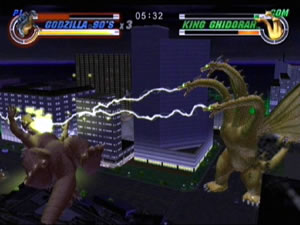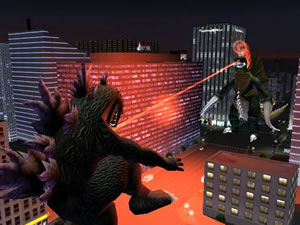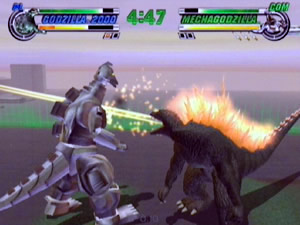Godzilla Vs. The GameCube.
As a kid sitting in a public school classroom, I had these recurring daydreams
where I’d turn into a monster and destroy stuff. One was that I would suddenly
turn into the dragon-man from Sega’s Altered Beast and destroy everything
around me in a burst of lightning and then fly away to destroy whatever else I
felt like destroying. The other was that I might turn into Godzilla and kill some
monster threatening my current crush. [Congratulations, Joe – you win the Nerdiest
Introduction of 2002 Award! – Ed.]
Alas,
this dream had nearly passed…and then Godzilla: Destroy All Monsters Melee
came out, and the dream was reborn. While this game could definitely stand a
little more love for everyone’s favorite radioactive lizard, it does satisfy
thanks to one of the coolest licenses ever. It’s just a shame that the final
product isn’t some sort of rough draft and that the better version isn’t due
in stores in a couple months.
The story begins with those annoying
Martians (you know, the ones who were vulnerable to fire-alarms) attempting
to subjugate Earth by taking control of all the monsters on Monster Island.
And then, the story ends. It picks up again at the end of the game with the
Martians fleeing in their spaceships, cursing the monster that eluded their
mind-control and whupped every other monster’s ass. There you have the entire
story arc of Adventure Mode, the single player mode that allegedly has a story-line
and through which you unlock all the levels and monsters.
While Godzilla movies weren’t known for their intricate plots or character
development, they were over-the-top and had tons of character. Godzilla:
DAMM misses this and sets up the fights without any context or cinematics
or story, or any other nerdy details that a fan like myself might enjoy. Where
are Mothra’s singing midget girls? What
about some underwater
battles? The time spent on setting up the battles and giving them relevance
beyond the bare bones “Get ready to kick some monster ass!” is pretty much zero.
While Godzilla: DAMM includes Godzilla, it is not Godzilla.
The battle mechanics are entertaining but shallow. There’s a punch button, a kick button, and another miscellaneous attack button (which is usually for tail attacks or some other harder, slower attack). Jamming on any of the buttons results in a combo, and holding the analog stick in a given direction affects the nature of the attack (say, a hammer-fist as opposed to an uppercut in cases where the punch button is depressed). There are also buttons for blocking, ducking, running, and jumping, and each have their uses.
There’s also a projectile button, which when held and released charges and
fires a monster’s projectile attack, and when tapped unleashes a devastating,
energy-consuming attack. Also, every monster has the ability to pick up certain
buildings and hurl them at their foes. Players can also hurl opposing monsters
into buildings, resulting in damage to the monster and the destruction of the
building.
However, the environments could have been even more interactive and the visual
destruction even more impressive. For example, if a monster is hurled into a
building, the building appears unaltered until moments later when it crumbles.
Buildings don’t fall into other buildings, no buildings become towering infernos,
and no monsters get buried under debris. However, as the match progresses, the
cities (including Tokyo, London, San Francisco and others) become more and more
decimated. As cities get destroyed, the military becomes more aggressive, but
their assault never seems to measure up to the damage meted out and the tanks
and choppers never become more than a nuisance.
 The
The
gameplay is generally well implemented, especially as far as Godzilla himself
is concerned. None of the other monsters seem as balanced or fun to play; but
then, Godzilla is also a way cooler character than Megalon or King Ghidora or
Rodan. The problem here is that the control scheme for every monster is identical,
whereas the monsters are extremely different. The scheme fits Godzilla perfectly
with his punches and kicks and flame breath, but seems out of touch with characters
like King Ghidora or Rodan who rely on flying attacks and breath attacks.
The melee aspect of Godzilla is enjoyable, but a little too slow to
entertain a party of people. The rounds tend to be long and the action repetitive.
The game specifically lacks a certain ‘oomph’, which could be made up for by
more explosive special attacks.
For example, there are icons that can be grabbed by players to bolster health,
energy, Mothra (Mothra attacks everyone but the person who grabbed the icon)
and Rage. These rage attacks should be pure insanity, yet they are basically
attacks that affect everything within a certain radius of the player for moderate
damage. Godzilla emits a shockwave, which looks boring, doesn’t hurt much, and
doesn’t seem based on anything in any Godzilla movie ever. These Rage attacks
should be twice as powerful, twice as cool looking, and twice as frequent to
keep a good melee snappin’.
The graphics aren’t great. The monsters look halfway decent (Godzilla 2000
looks the best), but are weakly textured and suffer from mediocre animations.
The cities all look the same, the collapsing buildings look awful, and there
aren’t enough flashing lights and explosions. However, most of the breath attacks
look cool and the hit detection is generally better than average, which lends
a convincing appearance to most of the fights.
The game’s sound is equally mediocre. The creature roars are spot-on and creepy,
but the awesome, original Godzilla theme is
absent and the sound effects are generally weak.
While Godzilla may be the King of the Monsters, Godzilla: DAMM is not
the King of the Video Games. But every awesome, absent detail aside, Godzilla
is in this game and he is fun to play. If you can overlook the fact that the
developers don’t love Godzilla as much as you do, then you can easily spend
several enjoyable hours with Godzilla: Destroy All Monsters Melee.

-
GODZILLA!
-
Godzilla plays well
-
Passable graphics
-
Boring control scheme
-
Not much depth
-
Lacking care and love and chaos







